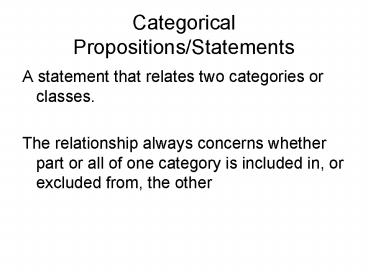Categorical PropositionsStatements - PowerPoint PPT Presentation
1 / 17
Title:
Categorical PropositionsStatements
Description:
Subject and predicate term, which denote the two classes ... But it does not say something about all athletes, so the predicate term is not distributed. ... – PowerPoint PPT presentation
Number of Views:31
Avg rating:3.0/5.0
Title: Categorical PropositionsStatements
1
Categorical Propositions/Statements
- A statement that relates two categories or
classes. - The relationship always concerns whether part or
all of one category is included in, or excluded
from, the other
2
Parts of Categorical Statements
- Subject and predicate term, which denote the two
classes - Quantifiersterms which denote how much of the
subject class in included in or excluded from the
predicate class - The quantifiers are all, no and some
- A copula, which links the subject and predicate
term (are and are not)
3
Standard Form
- Four forms In this class we will learn how to
express any categorical statement in one of these
four forms - 1. All S are P (this says every member of S is
included in P) - 2. No S are P (this says every member of S is
excluded from P) - Some S are P (this says a part of the members of
S is included in P) - Some S are not P (this says a part of the members
of S are excluded from P)
4
Quality and Quantity
- Quality and quantity are attributes of
categorical statements - Quality refers to whether the statement is
affirmative or negative - Quantity refers to whether the statement is
universal or particular
5
Our Four Forms Again
- All S are P
- No S are P
- Some S are P
- Some S are not P
- What is the quality and quantity of the
individual forms?
6
Continued
- All S are P
- Quality Affirmative Quantity Universal
- No S are P
- Quality Negative Quantity Universal
- Some S are P
- Quality Affirmative Quantity Particular
- Some S are not P
- Quality Negative Quantity Particular
7
Ah Latin!
- For various historical reasons having to do with
Latin, the four forms each have letter- names - A All S are P
- E No S are P
- I Some S are P
- O Some S are not P
8
Distribute Me
- Distribution is a property of terms
- A term is distributed just in case the
categorical statement asserts something about
every member of the class denoted by the term
9
Take a Look
- A All S are P
- Consider this substitution instance
- All baseball players are athletes
- This says something about all baseball players,
so the subject term is distributed. But it does
not say something about all athletes, so the
predicate term is not distributed.
10
More
- E No S are P
- Consider this substitution instance
- No snakes are mammals
- This asserts something about all snakes (all of
them are excluded from the class of mammals) and
all mammals (all of them are excluded from the
class of snakes). So both the subject term and
the predicate term are distributed.
11
More More
- I Some S are P
- Consider this substitution instance
- Some cats are pets
- This does not assert something about all cats
neither does it assert something about all pets.
So neither term is distributed.
12
And Finally
- O Some S are not P
- Consider this substitution instance
- Some students are not athletes
- This does not assert something about all
students, so the subject term is not distributed.
But it does say something about all athletes
all of them are distinct from at least one
particular student. So the predicate is
distributed.
13
Smackdown Aristotle vs. Boole
- Do statements in A form imply statements in I
form? - For example, does
- All S are P (e.g. All cats are pets)
- imply
- Some S are P? (e.g. Some cats are pets)
14
What They Say
- Aristotle it depends. If we assume that S
denotes a class of existing things, then the A
statement implies the I statement. If we do not
assume this, then the A statement does not imply
the I statement - Boole No. A statements never imply I statements.
15
Same Question for E
- Do statements in E form imply statements in O
form? - For example, does
- No S are P (e.g. No monkeys are reptiles)
- imply
- Some S are not P? (e.g. Some monkey are not
reptiles)
16
What They Say
- Aristotle it depends. If we assume that S
denotes a class of existing things, then the E
statement implies the O statement. If we do not
assume this, then E statements do not imply O
statements. - Boole No. E statements never imply O
statements.
17
Verdict
- In doing formal logic we do not want it to turn
out that whether one statement implies another
depends on the content of the statements. But
the Aristotelian approach does just this. - So Boole wins!































